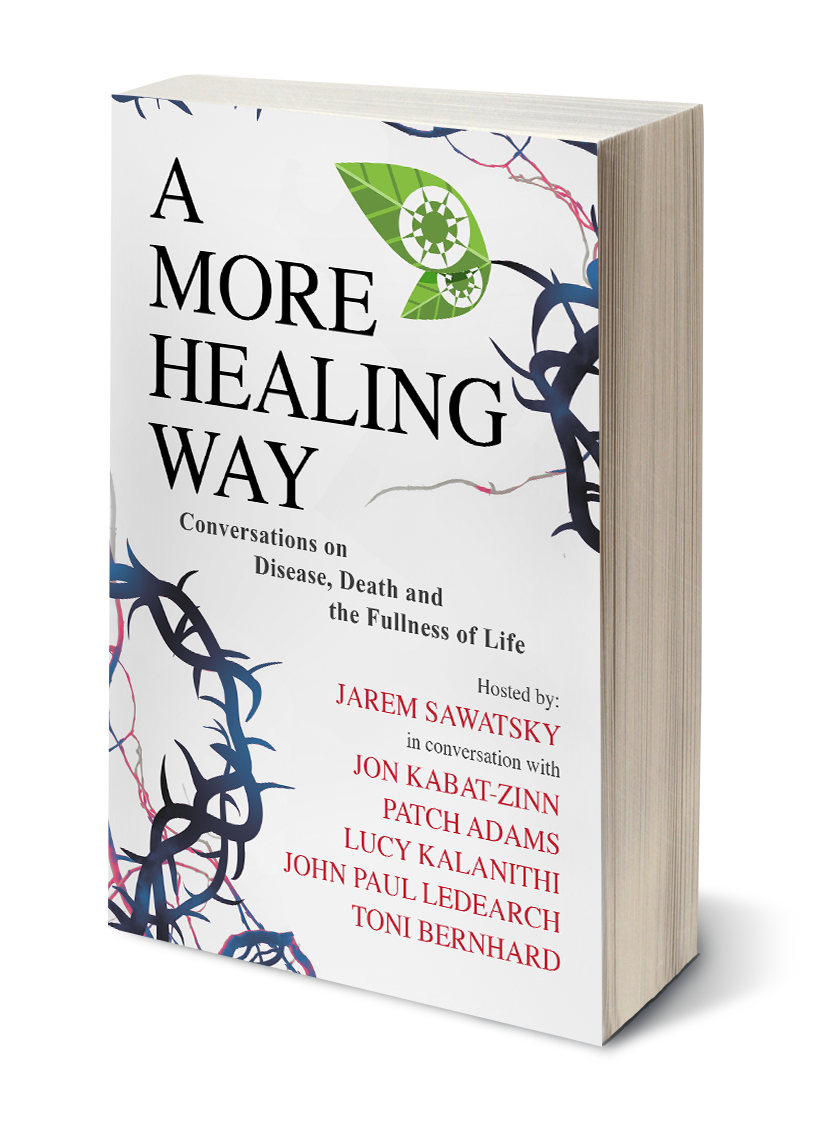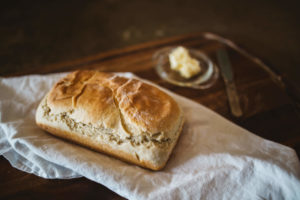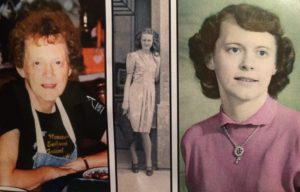
Where should I send the audio and video series?

Where should I send the audio and video series?
My wife’s mother died this week. She had Alzheimer’s but died from a stroke. She was deeply loved by many, many people – including myself. Almost exactly a week ago, on Tuesday morning she had a stroke. By supper time she was unresponsive in the hospital. Two days later, on Thursday morning, after each of her children had been at her side, she took her last breath and died.
Yesterday was the funeral.
We have been taught – by so many voices – to fear death. And yet death is so profoundly human. It is one of the few sacred tasks every human share: birthing and dying. Often, but not always, these sacred tasks that unite humanity include breathing, eating, peeing and pooing. We need to learn to do each task with compassion and love. We need to resist the culture of fear and anxiety at each step.
How do we unlock the keys to dying well? Here are some of my insights from this past week of mourning and celebrating the life of my mother-in-law – Kathleen Hildebrand.
The word companion literally means to accompany with bread (com=with; panion=bread). I think accompanying others with bread is one of the most powerful peacebuilding acts. While we often don’t think about it in those terms, this is deeply ingrained in many cultures. When I got the call that my mother-in-law had a stroke and was in the hospital with her children gathering around, before I started my journey south to the family, I stopped at the organic bakery where they try to bake with love. I picked up several whole loaves for the family to break at her bedside. Over the week leading up to her funeral, more bread and buns kept showing up at my brother-in-law’s door. The community was accompanying us, the mourning family, with bread. And again after the funeral and burial, we returned to the church basement where there was no further program except, for the community to accompany us with bread – this time, buns. What a beautiful response to death! What a beautiful way to create the space where we could feel the healing support of the community – accompanied by bread! I think one of the keys to dying well is to be a peace and healing companion – to show where people are in pain and accompany them with bread (or bannock, or whatever).

Even with my personal experience of having a terminal disease, I don’t know what are the right words to say in those moments of great pain and letting go. In my experience, words are often wholly inadequate vessels to communicate. The more times I go through these experiences of being present to death and dying, the freer I feel not have the words. I think presence is enough. To be truly present with another human is a kind of communion. There is a deep solidarity among those who remain present in suffering – often in a silence that communicates more powerfully than words.
While I was doing my Master’s degree in peace and conflict in Virginia, Rhona and I worked at a retirement community right next to the university campus. We were on-call evenings and weekends to help residents deal with emergencies. Over time, we started to learn what was really important to residents. They often would speak of dying. More specifically, they would speak of their hope about dying by some method that was quick and relatively painless. For them, a quick death was living the dream, the best way to go.
This past week I thought of those residences at the retirement home. I wondered about the ones who got their wish to die a quick death. I wondered if their families would have felt the freedom to celebrate this dream die. Generally, when someone dies we expect that we need to respond to the death as a tragedy. “I am so sorry for your loss,” we say to mourners. And indeed there is loss and sorrow that comes from death. But surely not every death is best labeled a tragedy. How do we create space to celebrate dying well and dying as a natural part of living? How do we let go of the idea that something was unfairly stolen from us?
When my mother-in-law was given the diagnosis of having Alzheimer’s, I wanted to talk with her about what it feels like to have a such a disease, as I felt a kind of kinship in also having a terminal disease. However, my mother was not interested in my questions. In fact, in my presence, I can’t remember a time when my mother-in-law used the language of Alzheimer’s to talk about her path. I am not sure why. She was not in denial. Instead, she would often say “I am losing my vocabulary.” At first, I found this funny. She could not remember what a TV was called or the names of her husbands – whom she referred to as husband #1 and husband #2. However, she could always remember the word vocabulary. But I think there is much insight into her words. Vocabulary – the vessel of words – is often the means through which we communicate and make sense of the world. For her, losing her vocabulary became “problematic” when she would try to communicate with others. At times it was like we were in a never-ending game of charades as we each guessed what word she was looking for. But if you take away the words, much was still left before her stroke. Kathleen could see, be present and love deeply. And she did. I don’t know why but Kathleen did not experience a radical personality change which sometimes happens with Alzheimer’s. Kathleen lost her vocabulary but not her ability to love. What a marvel!

In Kathleen’s last days, what did she fear? What made her anxious? In my view, one of the things that made her anxious was her view of heaven where she would be reunited with two husbands (the first who died of leukemia decades earlier and the second who died of cancer just three years ago). For her, the idea that she would die and be in heaven was not entirely a comforting thought – would she have to choose between husbands? This wasn’t the dominant theme in her last days but seemed to me to be consistently present.
As a Christian who has a degree in theology, I do not believe in a heaven that you go to when you die. I think that is a very dangerous idea which is not actually found in the Christian scriptures. This idea of heaven creates for many fear and anxiety, and these are not the fruits of the spirit. This idea of heaven as a family reunion needs to be explored much more deeply – when was the idea invented? By whom? Who benefited from the idea? When it was put into practice, did the neighbours of Christians experience it as the fruit of the spirit – love, joy, peace, forbearance, kindness, goodness, faithfulness, gentleness and self-control? If not, then the idea was likely not from God or from love.
As my loving mother-in-law was in her last days, she experienced a kind of anxiety about heaven. I see this view of heaven as false. It pained me to see Kathleen in an anxiety that seemed to come from a wrong view of heaven. This was adding confusion in her last days when she needed her focus elsewhere.
Laughter, tears, and silence came like healing waves in the hospital room. And then again at home, at the viewings, and at the funeral. This was a gift. The kind of gift that comes as family and community are present to the dying of a loved one. One of the many things I deeply love about my in-laws is that they are very comfortable to do all three sacred practices together: laughing, tears, and silence (not necessarily in that order). I think one of the keys to dying well is creating space and giving permission for these three healing friends to do their healing work.
What did Kathleen care about? What was she curious about in her last days? There are many good answers to these questions. My reflections are just that. After Kathleen died I went to her condo. This was the week we were all supposed to help her move from condo life to assisted living life. On the floor of her living room were empty boxes for moving. Of course, these would now be used to take her last possessions away. Her condo was not overflowing with clutter. Mostly it was pictures of family that remained.
I went and sat on her couch. On the coffee table were the TV remotes she could never figure out how to use without help. But the coffee table was mostly clean save for a book that I automatically picked up to see what she was reading. Knowing I was in a rural, conservative bible-belt, I was not sure what I would find. I read the title “Living with Huntington’s Disease” (A Book for Patients and Families) by Dennis H Phillips. I have Huntington’s disease. She was reading about me! I flipped through the book – published by a university press in 1981. My mother, who was losing her vocabulary, was spending her last days trying to learn about my disease and what her family might be experiencing. In classic Alzheimer’s style, she had kept reading and re-reading that same short section of the book and would then relay her “new” learning on to her other family members, again and again, and again. But this moved me. Her attention did not focus for too long on herself, but she was trying to help others as any had to need. She was trying to understand me and my family.
I didn’t say much, but the theme arose later in the week when my wife and her siblings had to decide which charity they would ask people to donate money to in lieu of flowers. I was not at this meeting but was told afterward that the family wanted to pick something that illustrated what Kathleen was interested in at the end of her life. They decided to ask people to donate to the Huntington Society of Canada. These were my in-laws who did not have Huntington’s in their family, but as the last act of lovingkindness and sharing, they were asking people to make a donation that might support my family. What a surprising act of kindness! It came at a time when you don’t expect a mourning family to reach out to support others!
Now when people ask – “Sorry to hear about Rhona’s mom. How are things?” I want to explain my deep sense of awe and gratitude, but in the moment words fail me. Perhaps I too am losing my vocabulary. I hope Kathleen’s compassion and curiosity will guide me on this path.
What are your thoughts on this? Comment below.
Ralph Thanks for your note. I just changed the font as many of us struggle with the issue you raised. Check out the website and let me know if it is still a problem. All the very best.
Jarem
As a CMU (CMBC) graduate, and a psychiatrist, I have long bemoaned the fact that the “battle” metaphor is so often used by friends of persons with a life-shortening condition, especially cancer. In “Dancing with Elephants” you do a masterful job of expounding on how we need to abandon this metaphor.
George Dyck
North Newton, KS
Thank you Jeremy, for your deep and thought provoking words. I have often asked the question …what is Heaven, where is Heaven…especially since I have lost a child as well as my husband. I love the three friends you refer to; laughing, tears and silence. Silence is one area in which we have much to learn. When we were in Congo and lost a healthy son due to an accident, I found out what silence was. My dear Congolese friends know how to sit in silence, mourning with the ones who have lost a loved one. Why? Because they have lost not one child, but many. They do not leave the mourning persons alone with their grief. They seem to understand a spiritual aspect of death that I do not. I also commend you for the deep love you have for your in-law family especially the love you had for your Mother-in-law. By the way I would love to have your book. Can you tell me where I can purchase it? Your cousin aunt from BC.
Jarem, you are still the teacher. Your observations and reflections speak to me…and I want to hold this portrait of my Big Sister close.
I look forward to some visits with you and yours ,with bread and reflections about life, dying, heaven, and laughter included.
THANK YOU
Your words have not failed you, Jarem, not one bit. Your thoughts and feelings are all here, beautifully expressed, that open new worlds of insight and understanding into this stigmatized issue of death.
I was at my Mother’s bedside as she stepped from this world into eternity. I felt many of the same things that you talk about here. I was alone with her, and had very little to say… but much to do.
Being there with her, stroking her hair, kissing her cheek. It was and always will be a great great treasure to me. She was there when I came into this world, and I was there when she left it. What a blessing.
Bless you, and thank you for this. Prayers for peace and comfort on your journey. I believe we are all broken in some way, and we are all truly just ‘walking each other home’. Hugs.
I fully enjoy your thoughtful expressions. I have, at this point, read only the article on Kathleen. I am awed by your use of the language of dying. I can hardly see for the tears that are still in my eyes after reading your article about Kathleen. It is beautiful.
I can’t help but wonder what your ideas of heaven are. You allude to it, but not in the sense that I feel I can understand what you are saying. I must say, I agree with you in that topic, as much as I understand it. But I don’t even know my own conclusions about this at this time. You would think a 75 year old would have found some more answers than I have. But I haven’t. As Kathleen’s 13 year younger brother, I think she went beautifully. I thank you and all the family for being there for us, her siblings, as well as for yourselves, the immediate family.
David Hoeppner
David thank you for your always interesting reflections. Concerning my thoughts on heaven, that requires more time but are some general strokes of my thinking. First more and more mainstream Christians have started to say publicly that they don’t believe in the idea of heaven as a place people go when they die and where they are reunited with their families. Even on of the top 4 leaders of the Church of England – N.T. Wright – does not believe in this kind of a heaven. I don’t this version of heaven can be found in the scriptures. As far as I can tell state when people die they earth to earth, ashes to ashes and dust to dust. There are a few passages that talk about the dead raising when Jesus returns. Even these passages seem to suggest then the dead are in the ground. My problem is heaven is I think it distort our faith. Farhana Qazi speaks how Islam gets destorted by people want into Paradice (and that the Quran has not mention of 72 virgins in Paradice. Thich Nhat Hanh speaks of how profound Buddhism get destroyed when people focus on getting out of this world and escaping to the Pure Land. I think it is the same with Heaven for Christians. And each time the faith traditions get distorted in ways that make them more violent and less loving. If this world does not matter, then we can do what ever it takes to get into the next world, we don’t have to care about this world, our conduct in it or about our neighbour. In my opinion that is opposite of love, the opposite of Jesus way (and Buddha’s way…). So I think we need to become curious about where these ideas about heaven were invented? who benefits? what becomes out o focus as we focus on this idea about heaven. Does this make any sense?
You are wise, and getting wiser. Thanks for sharing these insights, which resonate widely and deeply.
What a wonderful tribute to a lovely lady. I grew up with Vernon, David, Marie . Kathleen was older than myself. We were neighbours to the Heoppner,s in Altona. My sister Darlene and I graduated high school with Vernon.I pray for comfort and peace for the family.
Angela Siemens Brandt.
Calgary AB